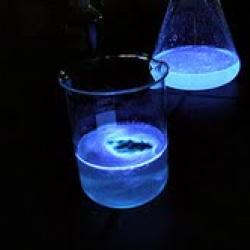Source Institutions
Source Institutions
Add to list Go to activity
Activity link broken? See if it's at the internet archive

Learners mix a solution of luminol with hydrogen peroxide to produce a reaction that gives off blue light. Learners discover that some chemical reactions release energy in the form of light, and that this process is called chemiluminescence. Activity guide includes examples of chemiluminescence in nature and commercial products. This activity is currently used in the Chemical Reactions Unit in OMSI's Chemistry Lab. Cost estimates are per 100 students.
- 10 to 30 minutes
- Under 5 minutes
- $1 - $5 per group of students
- Ages 4 - adult
- Activity, Experiment/Lab Activity
- English
Quick Guide
Materials List (per group of students)
- One small dark opaque bottle
- Two 10-ml graduated cylinders
- Two 250-ml squeeze bottles
- NaHCO3 (sodium bicarbonate) (keep 1000 g on hand)
- Na2CO3 (sodium carbonate) (keep 200 g on hand)
- (NH4)2CO3 (ammonium carbonate) (keep 100 g on hand)
- CuSO4
- 5H2O (copper sulfate) (keep 100 g on hand)
- C8H7N3O2 (luminol (3-aminopthalhydrazide)) (keep 25 g on hand)
- 6 500-ml brown plastic bottles
- One 1000-ml brown plastic bottle
- One 1 liter plastic bottle
- 3% H2O2 (hydrogen peroxide) (1 Iiter) — OR — 30% H2O2 (100 ml)
- Black tape
- One 50-ml glass beaker
Subjects
-
Life Sciences
-
Diversity of Life
- Animals
-
Diversity of Life
-
Physical Sciences
-
Chemistry
- Chemical Reactions
- Solutions
-
Vibration and Waves
- Light and Optics
-
Chemistry
Informal Categories
- Animals
- Nature and Environment
Audience
To use this activity, learners need to:
- see
- see color
- read
- touch
Learning styles supported:
- Involves hands-on or lab activities
Other
Components that are part of this resource:
This resource is part of:
Access Rights:
- Free access
By:
Rights:
- All rights reserved, Oregon Museum of Science and Industry, 1997
Funding Source:
- National Science Foundation
